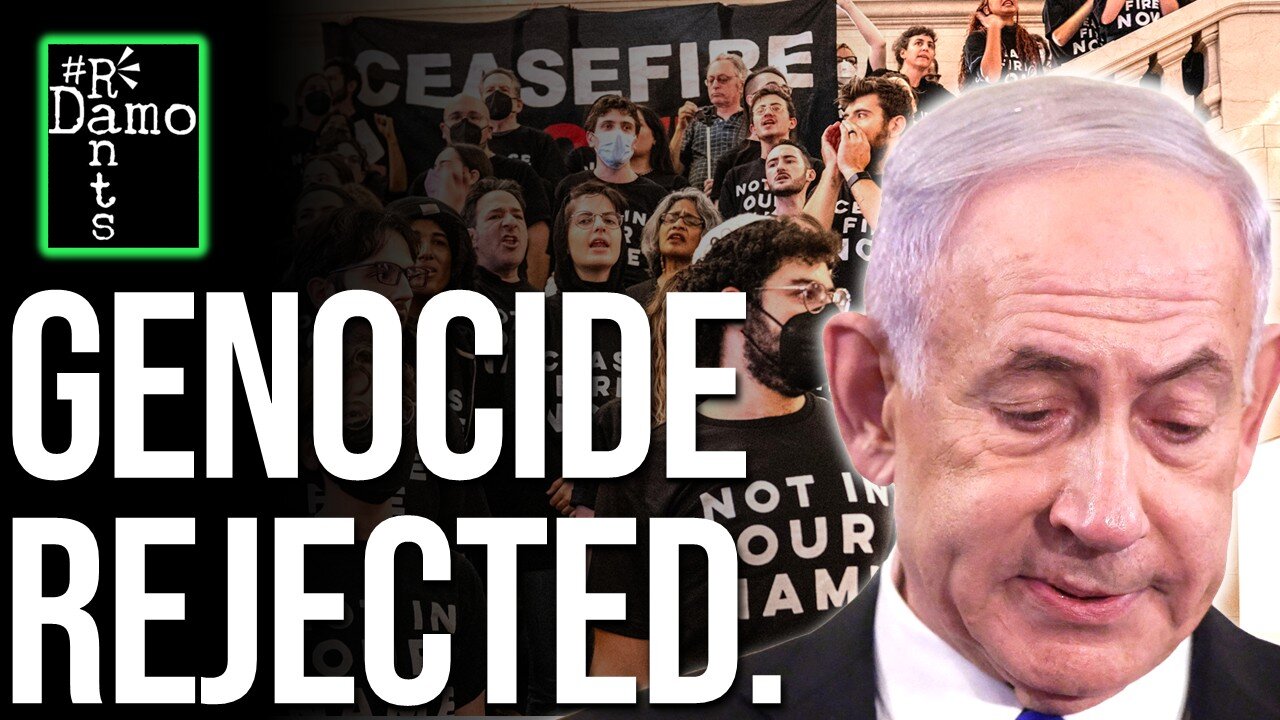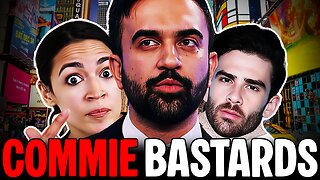Premium Only Content

Netanyahu Turns to Jews Abroad for Troops — And Faces Brutal Rejection
Right, so Israel likes to call the IDF not just the “most moral army,” but a “people’s army.” These days it looks more like an army without many people though, or certainly nowhere near enough. Benjamin Netanyahu is begging exhausted reservists to keep fighting, waving unenforceable draft orders at ultra-Orthodox Jews who would rather be dragged to prison than into Gaza, and now — in a gesture that borders on parody frankly and very much speaks to Netanyahu’s desperation even as he orders his under strength forces into Gaza City to commit yet more genocide — he has now been floating the idea of recruiting American and French teenagers to fill his ranks. For Benjamin Netanyahu, this is not about defending the nation but defending himself: every day the war drags on is another day his corruption trial risks being kicked further down the road. But when the people’s army has no people, when Jews at home and abroad alike refuse to serve, the mask slips. What is exposed is not strength or unity, but a hollow state clinging to ideology, making a mockery of the faith the state is supposedly founded on and militarism, desperate enough to conscript frankly anybody they can possibly get at this point.
Right, so for decades Israel has cultivated this image of itself as a nation in arms, a small state that survived in a hostile region because its people were bound together in service, succeeding, because they were God’s Chosen People. The Israel Defence Forces were more than an army. They were a cultural institution, a crucible in which generations of Israelis were socialised into national identity. Service was compulsory, and this was held up as proof of equality: every Jewish Israeli, regardless of class or background, would bear the burden. Unless you’re one of Netanyahu’s kids of course. This was the “people’s army” model, the idea that Israel’s survival rested not just on technology and strategy but on the willingness of its citizens to fight.
Yet today of course, this myth lies in ruins. The IDF is suffering a chronic manpower crisis, with senior officers admitting a shortfall of between ten and twelve thousand soldiers. Tens of thousands of reservists have failed to report for duty since the collapse of the most recent ceasefire. The attempt to conscript the ultra-Orthodox Haredim has collapsed into chaos, with mass protests in Jerusalem, Bnei Brak, Tel Aviv, and New York. Diaspora Jews, especially the younger generation, have no appetite to fight in Gaza. Instead of filling IDF ranks, they are leading anti-war demonstrations in Western capitals.
It is against this backdrop that the Netanyahu government has floated the extraordinary idea of recruiting Jews from abroad into the Israeli army. Officials have spoken openly about targeting Jewish communities in the United States and France, with the hope of attracting six to seven hundred volunteers each year, well that’ll make all the difference I’m sure. The pool of eligible diaspora youth is estimated at no more than ten thousand, so on the face of it, these numbers are trivial compared to the shortfall and only a fraction of those available clarly would be interested. But symbolically the move is enormous. For the first time, Israel is admitting that it can no longer count on its own citizens to fight its wars.
The roots of the crisis go back to the founding of the state. When David Ben-Gurion agreed in 1948 to exempt a few hundred yeshiva students from military service, it was a pragmatic decision. The Haredim were a small community devastated by the Holocaust. Ben-Gurion reasoned that preserving Torah study was essential for the continuity of Jewish tradition. He also needed political support for the fledgling state. The exemption was thus both symbolic and practical, a recognition that Judaism meant more than nationalism, that prayer and study could exist alongside the rifle and of course in this Israel laid claim to being the Jewish State, study of faith was itself a form of national service.
Over the decades, however, the exemption grew into a chasm. The Haredi population expanded rapidly, fuelled by high birth rates and religious devotion. From a few hundred students, exemptions became tens of thousands. By the 1980s and 1990s, secular Israelis increasingly complained of an unequal burden: their children were sent to serve and sometimes die, while Haredim continued their studies.
For the Haredim, however, Torah study was not avoidance but the highest form of service. They argued that safeguarding spiritual life was the truest defence of the Jewish people. Zionism, in their view, was a nationalist project masquerading as religion. In this light you gain an insight into why the Ultra-Orthodoxy of global Jewry reject Zionism on the whole, they are anti-Zionist Jews. Only the Messiah could legitimately restore Jewish sovereignty in the Holy Land, not mortal men redrawing boundaries around a promise supposedly given 3000 years ago. The IDF was thus not a sacred duty but a secular imposition on them.
This uneasy coexistence has persisted for decades. Secular Israelis grumbled but tolerated it, comforted by the IDF’s strength. The contradiction only came to a head when Israel’s wars grew longer and bloodier, and when the Haredi share of the population became too large to ignore. In 2024, the Supreme Court struck down the exemption as unconstitutional, insisting that equality required the Haredim to serve. What followed was not compliance but rebellion.
Tens of thousands of Haredim poured into the streets of Jerusalem and Bnei Brak. Draft orders were burned. Roads were blocked. Protesters clashed with police in Tel Aviv. The slogans were uncompromising: “We will die and not serve.” The fury was echoed abroad. Ultra-Orthodox communities in New York, London, Antwerp, and Paris staged solidarity demonstrations, condemning Israel for waging what they described as a war on Torah itself. Instead of yielding soldiers, the move exposed the deep fracture in Israeli society between militarism and religion. Instead of being the Jewish State, the state is actually attacking their most devout. What happens when a state that calls itself Jewish turns its police against Jews who insist that their service is to Torah, not to the rifle?
The timing of the Supreme Court ruling, and the government’s fumbling attempts to enforce it, cannot be separated from Netanyahu’s political predicament though – as ever it is the root of everything. The Prime Minister remains on trial for corruption charges including fraud and breach of trust. Were it not for war, his opponents would likely have forced him from office long ago. But as long as Gaza burns, Netanyahu insists that leadership cannot change in the middle of conflict.
His coalition makes the situation even more volatile. On one side stand the far-right nationalists such as Itamar Ben-Gvir and Bezalel Smotrich, who demand the destruction of Gaza and the displacement of Palestinians. On the other once stood the ultra-Orthodox parties, Shas and United Torah Judaism, who demanded protection from conscription and left the coalition when they didn’t get it, leaving Netanyahu running a minority administration now. Netanyahu couldn’t placate both, their demands were irreconcilable. He cannot end the war without alienating the far right and he couldn’t enforce the draft without losing the Haredim.
This is why his policies look so contradictory. Last month, the IDF issued fifty-four thousand draft notices to Haredim. Yet enforcement was patchy. Arrests were made here and there, but the majority ignored the orders with impunity. The state gestured at equality while avoiding full confrontation. The purpose was not to solve the manpower crisis but to perform action, to buy time.
At the same time, Netanyahu cannot admit weakness. Hence the diaspora recruitment drive. If Israel cannot find soldiers at home, it will seek them abroad. The plan is less about numbers than about symbolism. It says to the world that Israel is still the army of the Jewish people. But in truth, it only underscores how badly Netanyahu is cornered.
If the Haredi exemption represents the collapse of the religious bargain, the crisis of reservists represents the collapse of the civic one. Israel’s army has long depended on reserves. The model was universal service followed by years of periodic call-ups. This is what made the IDF a “people’s army,” embedded in society.
But the Gaza war has broken this model. After nearly two years of mobilisations, reservists are exhausted. Reuters reports that only seventy per cent now answer call-ups. Tens of thousands have failed to report at all, with some estimates suggesting as many as one hundred thousand abstentions since the last ceasefire collapsed.
The reasons vary. Some are simply worn out after repeated deployments. Others are disillusioned with Netanyahu’s leadership, unwilling to sacrifice for a Prime Minister who prolongs war to save himself. Still others refuse on ethical grounds. The New Yorker all the way back in March documented cases of soldiers who declare they will not participate in what they see as collective punishment of Palestinians and its an issue that has only worsened.
The Financial Times has described the IDF as stretched to the limit, trapped in a “forever war” with no clear end. Soldiers rotated through Gaza speak of an “endless grinder.” Casualties mount, funerals become routine, but victory remains elusive.
This is not just a question of fatigue. It is a legitimacy crisis. The IDF has always been sustained by the belief that its wars were necessary for survival. Increasingly, its own soldiers no longer believe this. Can an army that its own reservists no longer trust still call itself the army of the people therefore?
The manpower crisis is compounded by the toll of casualties too. Though Israel censors precise numbers, reports confirm significant losses in Gaza and in skirmishes with Hezbollah. Families grow weary of burying sons and daughters. The psychological toll of endless war is evident. Soldiers speak of futility, of fighting not for security but for political theatre.
In the past, Israel’s military doctrine relied on rapid, decisive wars. The aim was to overwhelm the enemy quickly before international pressure or internal fatigue could mount. But Gaza has become the opposite: a grinding campaign with no victory in sight. The Houthis continue to strike southern Israel. Hezbollah remains defiant on the northern border. Iran looms as a constant adversary as Israel keeps rattling its underpowered sabre at them and Hamas of course have not been eliminated. The IDF projects overwhelming firepower, but it is undermanned, exhausted, and demoralised.
This is the context in which diaspora recruitment has to be understood. It is not a bold new strategy but an admission of failure. It is Israel saying to the world that it cannot sustain its own wars without foreign bodies, so now we want your citizens to fight for us too.
The IDF’s plan to target Jewish youth abroad is unprecedented. Officials hope for six to seven hundred recruits per year, the eligible pool is estimated at around ten thousand. Even if achieved, this is trivial compared to the shortfall of ten to twelve thousand soldiers.
But the symbolism is enormous. Israel is asking Jews abroad not just for money or political lobbying now, but for blood. It is demanding that diaspora Jews fight and die in Gaza for Netanyahu’s career.
The optics, naturally, as you can image are disastrous. Critics have already denounced the plan as exploitative, a form of neo-colonialism that treats Jewish identity as cannon fodder. In host societies, the move risks inflaming debates about dual loyalty, reinforcing stereotypes that Jews are bound first to Israel, which is of course antisemitic, yet Israel itself would be providing the fodder for such a notion.
The generational problem is even greater. Surveys show that only forty per cent of Jews under thirty in the United States feel attached to Israel, compared with nearly seventy per cent of older Jews. Younger Jews are more likely to join organisations like Jewish Voice for Peace or IfNotNow, which lead anti-war protests, than to enlist in the IDF. They see Gaza not as defence but as genocide just like so much of the rest of us do.
Thus, far from solving Israel’s crisis, diaspora recruitment threatens to accelerate estrangement from it. Why should young Jews in Brooklyn or Marseille fight in Gaza for Netanyahu to dodge the courtroom and stay in power? The hypocrisy is glaring, and it undermines the very narrative of Jewish unity that Israel claims to represent. And if even Jews abroad reject Israel’s call, what claim will the state have left to speak for the Jewish people at all? Even if it had any such legitimate claim to begin with?
At root, the recruitment crisis reveals a deeper truth: Israel has reduced Jewish identity to militarism. The state insists that the only valid form of Jewish service is armed service. Torah study has been dismissed. Diaspora dissent is vilified. Conscientious objection is criminalised.
This is why Haredi leaders insist the state has declared war on Torah. It is not hyperbole. For them, the demand for conscription is an existential attack on their way of life. For diaspora youth, the demand to enlist is an attempt to co-opt their identity into a war they reject.
Israel presents itself as the homeland of all Jews. But in practice, it polices Jewish identity, deciding which forms of Jewishness are acceptable. Faith, study, conscience, dissent — all are subordinated to militarism. The result is that Israel alienates the very communities it claims to represent and endangers Jews across the globe with its conduct.
The crisis is not only social but political. Netanyahu’s ultra-Orthodox coalition partners have walked out over the draft law. Analysts warned the government could collapse. The Prime Minister’s coalition is pulled apart by contradictions. The far right demands escalation and now have even more power and Netanyahu acquiesces to them. The Haredim demand exemption. Netanyahu tried to have it both ways, but he couldn’t.
War prolongs his tenure but also accelerates his downfall. Every day the conflict continues, more soldiers refuse, more protests erupt, more diaspora Jews turn away. Netanyahu clings to war as his shield, but it is a shield that is rusting in his hands.
For decades, Israel relied on diaspora support, particularly financial and political lobbying in the United States. Now, instead of fundraising dinners, the world sees diaspora Jews chaining themselves to the gates of weapons factories or protesting in front of Israeli consulates. The image of Jewish unity is collapsing.
The IDF’s legitimacy has always rested on the idea that it was the people’s army: universal service, shared burden, collective defence. But what happens when vast segments of the population refuse to serve? What happens when reservists abandon their posts? What happens when diaspora Jews refuse to enlist?
What happens is what we see today: a hollow army, undermanned and overstretched, reliant on firepower rather than people. Technology may substitute to some extent — drones, cyberwarfare, artificial intelligence. But no amount of machines can solve the deeper crisis of legitimacy.
A people’s army without its people is not an army. It is a facade. And a state that calls itself Jewish while criminalising Jews for refusing to kill is not a Jewish state. It is a militarist state cloaked in religious symbolism.
The recruitment crisis is more than a numbers game. It is a mirror held up to Israel itself. The state that once boasted of a people’s army is discovering it no longer has the people. The army that once symbolised Israeli unity now symbolises its fracture. The bargain that exempted Torah scholars as guardians of Jewish life has been torn up, and the result is not more soldiers but Jews in the streets, declaring that they will die before they serve.
Netanyahu’s desperation to prolong the Gaza war, to delay his corruption trial, and to cling to his coalition has collided with the reality of an army short ten to twelve thousand soldiers and a society no longer willing to fight for him. Reservists stay home. Families bury their dead with no victory in sight. Young diaspora Jews march in protest rather than in formation. The very people Israel claims to defend are refusing to be its foot soldiers.
This is the reversal that exposes the hollow core of Zionism. The state that promised to unite the Jewish people is alienating them instead. The homeland that claimed to defend Jewish life is criminalising Jews who refuse to kill. Israel clings to its ideologies, but its own people are slipping away.
The unanswered question now is unavoidable. If the people’s army has no people, and if Jewish identity itself is fractured by Israel’s demands, what truly remains of the Jewish state?
Certainly the scenes of objection in Tel Aviv this past weekend tell a story all of their own as the biggest protests in Israel’s history broke out, with a million Israelis out on the street demanding an end to the genocide and the return of the remaining hostages and little wonder when a ceasefire agreement engineered by negotiators from Egypt and Qatar was agreed to by Hamas, but Israel ignored it, choosing to march straight into Gaza City and massacres reported from the districts of Sabra and Zeitoun. Get all the details of that story imploding on the streets of Tel Aviv in this video recommendation here as your suggested next watch.
Please do also hit like, share and subscribe if you haven’t done so already so as to ensure you don’t miss out on all new daily content as well as spreading the word and helping to support the channel at the same time which is very much appreciated, holding power to account for ordinary working class people and I will hopefully catch you on the next vid. Cheers folks.
-
 56:11
56:11
X22 Report
2 hours agoMr & Mrs X - Women Are Fighting Back Against Men In Women's Spaces, It Has Begun - EP 15
23.1K8 -
 LIVE
LIVE
I_Came_With_Fire_Podcast
9 hours agoDark Hollywood, Ghosts on 'Cops', and Government Cover-Ups
114 watching -
 20:46
20:46
Jasmin Laine
1 day agoJoe Rogan Drops NUKE—Carney’s Secret Deal + 100,000 Kamloops Homes at Risk
6.67K25 -
 4:00
4:00
Mrgunsngear
1 day ago $17.61 earnedFirst They Came For Glock, Now They're Coming For The Ruger RXM
18.3K18 -
 1:42:46
1:42:46
Lara Logan
1 day agoINJECTING TRUTH INTO THE VACCINE DEBATE with Del Bigtree | Ep 43 | Going Rogue with Lara Logan
13.3K32 -
 12:55
12:55
Cash Jordan
20 hours agoNYC Busses 'MOBBED' by Millionaires... as "Communist" Mayor VOWS to END AMERICA
8.86K31 -
 LIVE
LIVE
Major League Fishing
1 day agoLIVE! MLF Toyota Series Championship!
563 watching -
 18:54
18:54
Bearing
1 day agoNew York COMMUNIST TAKEOVER 🚨 Zoran Mamdani’s Revolution 💥
10.9K78 -
 1:05:26
1:05:26
Man in America
1 day ago“Poseidon” Doomsday Sub, Microplastics & The War on Testosterone w/ Kim Bright
45.2K55 -
 12:15
12:15
Degenerate Jay
22 hours ago $0.30 earnedIs GTA 6 In Trouble?
3.27K